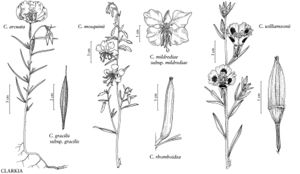Clarkia arcuata
Bot. Gaz. 65: 62. 1918.
Stems erect, to 8 cm, glabrous or puberulent. Leaves sessile; blade linear to narrowly lanceolate or oblanceolate, 1.5–6cm, surfaces glabrate. Inflorescences racemes, axis recurved at tip in bud; buds pendent. Flowers: floral tube 3–7 mm, puberulent with spreading hairs and shorter glandular hairs; corolla bowl-shaped, petals pinkish lavender, lighter proximally, often with dark reddish spot at base, broadly obovate or obdeltate, 10–30 mm; stamens 8, subequal; ovary 8-grooved, sparsely puberulent, hairs mostly glandular; stigma exserted beyond anthers. Capsules 10–35 mm; pedicel 5–15 mm. Seeds brown, 2 mm, minutely scaly, crest 0.5 mm, prominent. 2n = 14.
Phenology: Flowering Apr–Jun.
Habitat: Openings in woodlands and chaparral, serpentine soil.
Elevation: 0–1600 m.
Discussion
Clarkia arcuata is primarily distributed in the foothills of the Sierra Nevada from Mariposa to Tehama counties, sparsely south to Kern County, and with one disjunct occurrence in Shasta County; it has also been reported from Napa County.
Clarkia arcuata is morphologically most similar to C. lassenensis, from which it differs in fruit characteristics. The two species have distinct areas of distribution and attempts to produce hybrids have not been successful.
Selected References
None.
